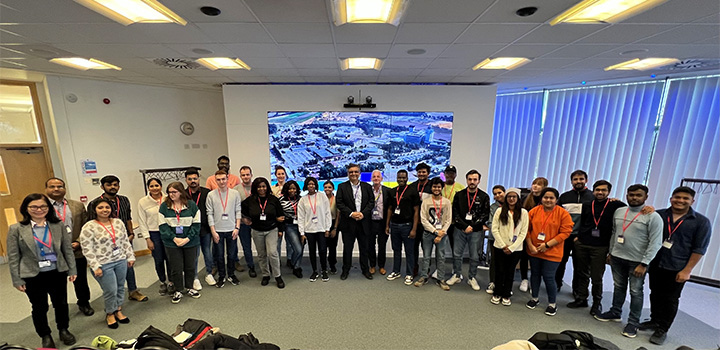National recognition for UEA’s MSc Cyber Security
By: Communications

(Photo credit: Getty Images)
The School of Computing Sciences at the University of East Anglia in Norwich has had its MSc in Cyber Security officially recognised with full certification by the UK National Cyber Security Centre (NCSC), the national technical authority for cyber security and a part of GCHQ. This certification places it among 29 universities across the UK that have received full NCSC certification.
Cyber security is defined as the protection of Internet-connected systems, hardware and telecoms networks, the data on them and the services they provide, from unauthorised access, attack or misuse.
The NCSC acts as a single point of contact for SMEs, large organisations, government agencies and the general public to provide advice guidance and support on cyber security, including managing large-scale cyber security incidents. The NCSC provides effective incident response to minimise harm to the UK businesses and critical infrastructure in the event of a cyber security incident and helps with recovery procedures to capture lessons learned for the future. This includes development of tools and processes to help strengthen cyber defences and provide for predictive capabilities to identify system vulnerabilities and digital attack surfaces.
The NCSC is the foremost authority in the UK when it comes to cyber security. As such their certification for UEA’s MSc Cyber Security is recognition that the students on the course receive the best possible education to meet the evolving skills demands from our economy and wider society for this important subject. This highlights the value and calibre of students that graduate from UEA’s MSc Cyber Security. The certification provides confidence for the students and their potential employers, about the quality of teaching they will receive and the industry valued skills that they will gain.
Dr Oli Buckley, Course Director, said: “The MSc Cyber Security has been designed to provide students with an excellent grounding of the core skills, knowledge and expertise needed to be valuable security professionals.”
Cyber security attacks can take many forms and guises, such as a fake email containing a dangerous link from a supposedly trusted source or the re-routing of customer data to servers that are illegal. Often the aim of computer hackers is to take control of a device such as a smart phone of laptop, allowing them to steal data and access passwords, giving them access to things such as online banking and health records.
Students on the course learn about network security, how to develop secure software alongside the ethical, legislative and human elements of cyber security. Testing systems for cyber-robustness is also a key part of the course.
Prof Gerard Parr, Head of School of Computing Sciences at UEA, stated: “We are delighted to receive this recognition from the UK’s National Cyber Security Centre. The Full Certification is testament to the course structure and content, the quality and expertise of colleagues who deliver the course as well as the strong links we have formed with a number of major industrial partners who give important insights for our students into current and future Cyber challenges.
Chris Ensor, NCSC Deputy Director for Cyber Growth, said: “I am delighted that The University of East Anglia has had its Cyber Security Master’s degree fully certified by the NCSC. It demonstrates our shared commitment to responsibly developing the cyber security talent pipeline.
“Offering a NCSC-certified degree helps prospective students make better informed choices about the quality of courses available and employers can rest assured that graduates will be well-taught and have valued industry skills.”
The successful certification of the Masters Degree is another element of UEA’s development as a hub for cyber security expertise. UEA recently had a team reach the finals of Cyber 9/12, a cyber policy competition run by The Atlantic Council. The team, UEAnonymous, reached the in person finals at BT Tower in London, making them one of the top 17 teams, out of 120 applicants.
Dr Oli Buckley, Associate Professor in Cyber Security at UEA, has recently established the Cyber Security, Privacy and Trust Research Lab, signalling UEA’s intent to further expand and develop UEA’s cyber security expertise. The group focuses on a broad range of cyber security issues from hardware-based research through to human perceptions of security.
Visit the website links to find out more information about UEA’s Cyber Security MSc course and the School of Computing Sciences.
Alternatively, contact Dr Oliver Buckley, MSc Cyber Security Course Director, at: o.buckley@uea.ac.uk.
Related Articles

Innovative AI solution to real-time seabed mapping earns UEA's School of Computing Sciences national recognition
UEA's School of Computing Sciences in-demand AI expertise has been recognised nationally after being named as one of Innovate UKs three finalists at their annual awards, following development of an innovative solution to real-time seabed mapping.
Read more
UEAnonymous at Cyber Strategy competition finals
UEAnonymous, a talented team of CMP students, made it to the finals of the Cyber 9/12 Strategy competition one of just 17 teams selected of more than 120 applicants.
Read more
MSc Cyber visit to Adastral Park
Led by Professor Gerard Parr and Dr Raheel Hassan, students taking the Cyber Security and Industrial Settings module visited BT's Research HQ Adastral Park in February.
Read more